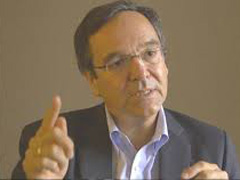The city advisor thinks that parks and streets are fundamental for the health of cities, enhancing solidarity among residents with different social backgrounds, and reinforcing the sense of belonging to the city.
The internationally renowned Colombian city-advisor Guillermo Peñalosa was interviewed by “Shared Spaces” on the last November of 2015, when he visited Barcelona to attend the 22nd edition of the Traffic Safety Forum. Throughout the interview, Peñalosa highlights the importance of streets as public spaces: “When we look at a city from the air, the biggest public spaces are the streets”. Peñalosa demonstrates being a fervent advocate of both parks and streets with wide sidewalks. Beyond the advantages for mobility, health, the economy and the environment, Peñalosa thinks of parks and streets as being strategic for the development of “a sense of belonging” to the city and its neighbourhoods, which enhances the solidarity between peoples from different social backgrounds, and acts as a force against the atomization and isolation of residents in large metropolis. Having public spaces like small or medium-size parks at a walking distance is crucial for social integration and quality of life, particularly in economically depressed quarters.
Peñalosa’s favourite public space, initiated by his team, is Bogota’s “Ciclovía”. Being the largest pop-up park in the world, the “Ciclovía” consists of some 121 kilometers of urban motorway that closes every Sunday, where several fences are put to keep cars from entering the site. As Peñalosa, proudly affirms: “You open it to people and close it to cars and magic happens”. A motorway that normally is the focus of noise and contamination becomes a space where low and high-income residents meet as equals, a space for informal commerce, for leisure and doing sport and for whatever unexpected could emerge.



